#cana of galilee
Text
Cana of Galilee
Cana of Galilee is the location of Jesus’ first miracle or the first sign that Jesus was the Messiah, found in John 2:1-11. The Wedding Church at Cana sits overtop of a first-century synagogue. This has been the only synagogue discovered in Cana; therefore, this is definitely where the story of the Wedding at Cana took place.
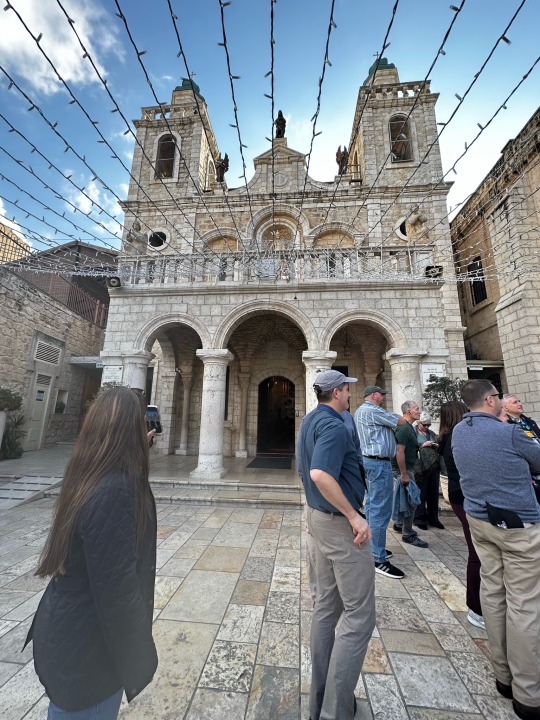
Pictured: The Wedding Church at Cana
On the third day, there was a wedding in Cana of Galilee. Jesus’ mother was there, and Jesus and his disciples were also invited to the celebration. when the wine ran out, Jesus’ mother said to him, “They don’t have any wine.” Jesus replied, “Woman, what does that have to do with me? My time hasn’t come yet.” His mother told the servants, “Do whatever he tells you.” Nearby were six stone water jars used for the Jewish cleansing ritual, each able to hold about twenty or thirty gallons. Jesus said to the servants, “Fill the jars with water,” and they filled them to the brim. Then he told them “Now draw some from them and take it to the headwaiter,” and they did. The head waiter tasted the water that had become wine. He didn’t know where it came from, though the servants who had drawn the water knew. The head waiter called to the groom and said, “Everyone serves the good wine first, and they bring out the second-rate wine only when the guests are drinking freely. You kept the good wine until now.” This was the first miraculous sign that Jesus did in Cana of Galilee. He revealed his glory and his disciples believed in him. - John 2:1-11
In the 1st century CE. weddings were a little different than what most of us know today. For starters, the guest list was somewhere between 700 and 1200 people. The entire town was invited along with all of your family, even the most distant relatives you didn’t know you were related to. Second, weddings lasted for 7 days: 6 days of celebrations with the actual ceremony/wedding on the 7th day. Hospitality (in most cultures besides America) is a big deal. If you didn’t have enough wine for the entire 7 days of wedding celebrations, it would be seen as a huge dishonor on the family. This mentality is still true today. Our guide said that any time he invites people over, they always prepare twice as much food just in case more people show up.
The last interesting part about first-century wedding customs is that men and women were always separated during the celebrations. What I found interesting was that our guide gave some cultural context to looking at verse 4 from the wedding story.
“Woman, why do you involve me?” Jesus replied. “My hour has not yet come.” - John 2:4
As a feminist, I’ve always struggled with this text, wondering why Jesus would address his mother as “Woman;” a phrase not necessarily used to convey endearment. Our guide gave the story context by explaining: Mary left the women’s section of the party and entered the men’s section to talk to Jesus. To address Mary as “woman,” was actually the most respectful way to address his mother in front of strangers. Calling her “woman” was not rude or disrespectful, but actually quite the opposite. Since this was a wedding with hundreds of people, likely many of whom Jesus didn’t know, he addressed Mary out of respect in a culturally appropriate way.
This is one of the many great examples of why it’s important to understand the cultural context that the Bible took place. Here I was annoyed that Jesus was being cheeky to his mother when he was being quite the opposite.
While visiting the church, each of the married couples had the option to renew their vows. Having only been married two months earlier, Jonathan and I weren’t going to participate but we got roped into it anyway. So now, I can say I’ve married my love twice now.
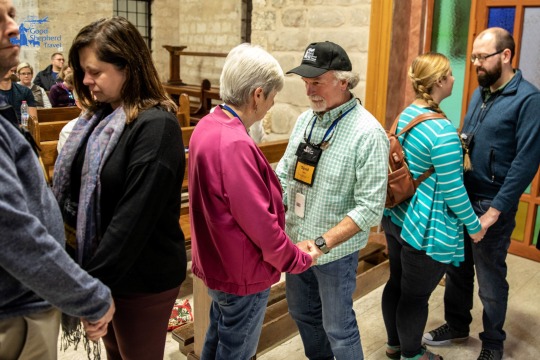
Pictured: some of us renewing our vows. I think Dave & Alice (in the center) were the couple married the longest while Jonathan & I were the newest newlyweds on the trip.
After seeing the church we went down below to look at the ruins of the first-century synagogue. Along with lots of rocks, we were able to see a first-century stone jar like the ones mentioned in the story.
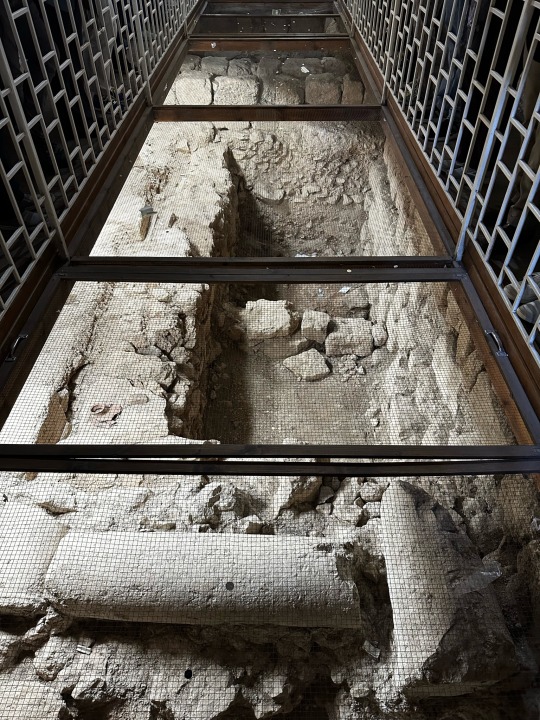
Pictured: ruins of the first-century synagogue
Nearby stood six stone water jars, the kind used by the Jews for ceremonial washing, each holding from twenty to thirty gallons. - John 2:6
The reason stone jars were used as opposed to clay, glass, or ceramic, is that stone is the only element that doesn’t become unclean after it is used in a sacred manner. The jars were not moved, which is good because I’m pretty sure no one could lift them.
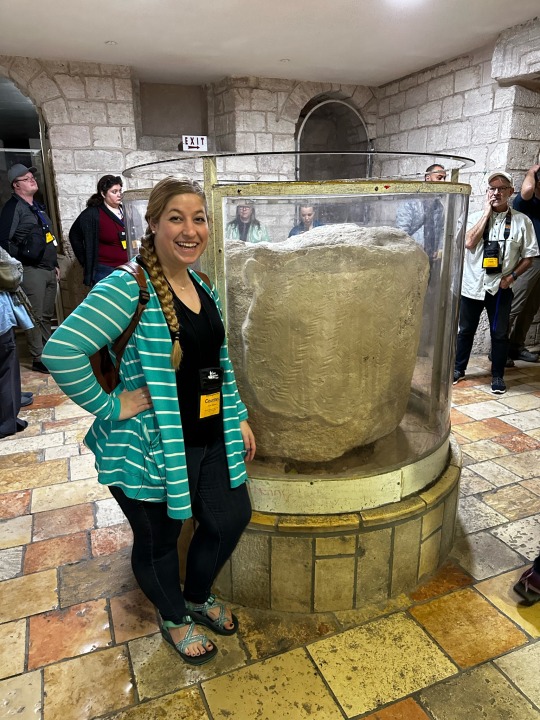
Pictured above: a first-century stone jar with me for size comparison
Once we were done visiting the church, we walked around some of the shops next door and got to try some of the famous “Wine from Cana.” The lovely woman who let us try the wine said “It’s sweet so you think of Jesus when you drink it!” Thankfully, our tour guide informed us (before we visited the site) that there are no wineries in Cana so it’s all just a tourist trap. Hey, can’t fault them for trying, I’m sure there are lots of people who bring home wine bottles from Cana! (Yes, I totally wanted one. No, we did not get any)
4 notes
·
View notes
Text
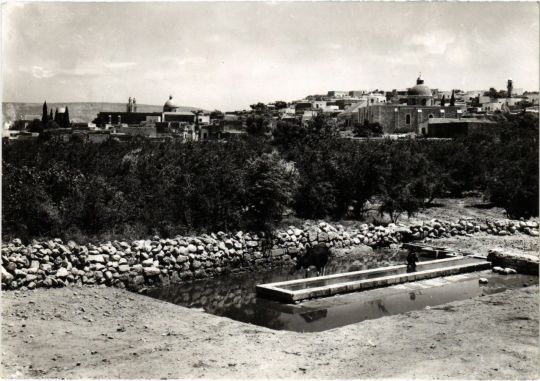
View of the Cana of Galilee, Israel
Italian vintage postcard, mailed to Neuilly-sur-Seine, France
#vintage#neuilly-sur-seine#tarjeta#france#briefkaart#postcard#photography#postal#carte postale#sepia#neuilly#ephemera#seine#historic#israel#the cana of galilee#ansichtskarte#italian#galilee#view#postkarte#cana#postkaart#mailed#photo
2 notes
·
View notes
Text
My new video looks at Jesus' second recorded miracle, the healing of a Royal Official's son who was dying 20 miles away in Capernaum. The Nobleman had traveled and found Jesus, and pleaded with him to come visit his son so that he could be healed. The man's faith in Jesus was rewarded when eventually Jesus told him to depart, that his son would live. The Royal Official took Jesus for his word, and returned home to find out that his ill son was totally healed. The Nobleman was told that his son was healed at the seventh hour, the exact time Jesus had spoken to him that his son would live.
youtube
#second miracle of Jesus#healing a royal official's son#faith and trust#Cana in Galilee#the nobleman#a sick son#traveled 20 miles to see Jesus#Capernaum#begged Jesus to heal his son#the man's faith#persistent asking#Jesus tells him to depart#Jesus tells him his son would live#healed at the seventh hour#Jesus did not visit the ill son#taking Jesus at his word#belief in Jesus#Jesus is the restorer of life#his faith in Jesus was rewarded#Youtube
1 note
·
View note
Text
John 4:46–48
46 Ἦλθεν οὖν πάλιν εἰς τὴν Κανὰ τῆς Γαλιλα��ας, ὅπου ἐποίησεν τὸ ὕδωρ οἶνον. καὶ ἦν τις βασιλικὸς οὗ ὁ υἱὸς ἠσθένει ἐν Καφαρναούμ. 47 οὗτος ἀκούσας ὅτι Ἰησοῦς ἥκει ἐκ τῆς Ἰουδαίας εἰς τὴν Γαλιλαίαν ἀπῆλθεν πρὸς αὐτὸν καὶ ἠρώτα ἵνα καταβῇ καὶ ἰάσηται αὐτοῦ τὸν υἱόν, ἤμελλεν γὰρ ἀποθνῄσκειν. 48 εἶπεν οὖν ὁ Ἰησοῦς πρὸς αὐτόν· ἐὰν μὴ σημεῖα καὶ τέρατα ἴδητε, οὐ μὴ πιστεύσητε.
My translation:
46 He came, then, again into Cana of Galilee, where he made the water wine. And there was a certain royal whose son was ailing in Capernaum. 47 This man, having heard that Jesus has come out of Judea into Galilee, went away toward him and was asking that he might go down and heal his son, for he was about to die. 48 Jesus said, then, to him, “If you see not signs and wonders, you will certainly not believe.”
Notes:
4:46
οὖν ‘expresses sequence, not causation’ (ICC); NET: “Now”; NRSV, HCSB: “Then”.
Jesus is the unexpressed subject of the 2nd aorist ἦλθεν (from ἔρχομαι), which is modified by the temporal adverb πάλιν and spatial prepositional phrase εἰς τὴν Κανὰ. The genitive τῆς Γαλιλαίας is partitive.
The clause introduced by locative particle ὅπου modifies Κανὰ above. Jesus is the unexpressed subject of the aorist ἐποίησεν (from ποιέω) and τὸ ὕδωρ the direct object. οἶνον is a predicate (“made the water to be wine”).
The adjective βασιλικός (5x), from ὁ βασιλεύς, is, “belonging to a king, royal”; substantival: “royal official” (most translations). The subject of the imperfect ἦν (from εἰμί) is βασιλικὸς, which is modified by the indefinite pronoun τις (“a certain royal official”, NIV, NET, HCSB).
The antecedent of the relative pronoun οὗ is βασιλικὸς. οὗ is a genitive of relationship with ὁ υἱὸς, which is the subject of the imperfect ἠσθένει (from ἀσθενέω “I am sick”). The imperfect-tense of the verb is progressive. The locative prepositional phrase ἐν Καφαρναούμ is better taken with ἦν rather than ἀσθενέω.
4:47
The substantival near-demonstrative pronoun οὗτος, referring to βασιλικὸς, is the subject of the main verb ἀπῆλθεν below. The aorist participle ἀκούσας (from ἀκούω) is temporal/causal with ἀπῆλθεν (“When/because he heard”).
ὅτι introduces indirect discourse after a verb of perception.
Ἰησοῦς is the subject of the present ἥκει (from ἥκω “I have come”). The present-tense is retained in indirect discourse. The verb is modified by the spatial prepositional phrases ἐκ τῆς Ἰουδαίας and εἰς τὴν Γαλιλαίαν.
οὗτος above is the subject of the 2nd aorist ἀπῆλθεν (from ἀπέρχομαι), modified by the prepositional phrase πρὸς αὐτὸν (“went after him”, EGGNT). οὗτος is also the subject of the imperfect ἠρώτα (from ἐρωτάω). The aorist tense of the verb may be iterative (“kept asking him”), it may emphasize the content of what was asked vs. the fact of the asking, or it may anticipate the fact that his request is not immediately granted (see note on v. 40).
ἵνα + subjunctive here introduces not purpose but the content of the request.
The 2nd aorist subjunctive καταβῇ (from καταβαίνω) and aorist subjunctive ἰάσηται (from ἰάομαι “I heal”) form the substance of the request. αὐτοῦ, referring to the official, is a genitive of relationship with τὸν υἱόν, which is the direct object of ἰάομαι.
The son is the unexpressed subject of the imperfect ἤμελλεν (from μέλλω); this verb often takes an eta augment in the imperfect (μέλλω does not occur in the aorist). The present infinitive ἀποθνῄσκειν (from ἀποθνῄσκω) is complementary with μέλλω. The present-tense of the infinitive is idiomatic; μέλλω almost always takes a present infinitive.
4:48
οὖν could be transitional (“Then”, NRSV; but cf. NASB, NET: “So”).
The subject of the 2nd aorist εἶπεν (from λέγω) is ὁ Ἰησοῦς. The use of the prepositional phrase πρὸς αὐτόν is slightly stronger than a simple dative of indirect object. EGGNT notes that the response of Jesus could be a question (so NLT) or a statement (so most other translations).
ἐὰν μὴ is, “unless”.
σημεῖα καὶ τέρατα (“signs and wonders”; τέρας is never found apart from σημεῖον in the NT) is the direct object of the 2nd aorist subjunctive ἴδητε (from ὁράω; subj. after ἐὰν). Note the use of the plural verb (“you people”, most translations).
The double negative οὐ μὴ is an emphatic negation with the aorist subjunctive πιστεύσητε (from πιστεύω): NASB: “you simply will not believe”; NIV, NET: “you will never believe”.
0 notes
Text
Live Stream Sunday School - October 30, 2022
Live Stream Sunday School – October 30, 2022
https://www.facebook.com/gaines.melvin/videos/1167646834159004
Sunday school session for Akron Alliance Fellowship Church, Akron OH.
John 4:46-54.

View On WordPress
#afternoon#alive#Cana#Capernaum#faith#Galilee#goverment#help#home#John#John 4#live#miracle#official#prayer#sick#sign#son
0 notes
Text
Filled To The Brim
Filled To The Brim
Tuesday’s Column: Dale Mail
Dale Pollard
The first miracle of Jesus is found in John chapter two. While many won’t give much thought to the servants in this account, let’s place the focus on them here.
John 2.1-11
“On the third day there was a wedding at Cana in Galilee, and the mother of Jesus was there. Jesus also was invited to the wedding with his disciples. When the wine ran out, the…

View On WordPress
0 notes
Text
On Ivan and bipolar disorder (part two)
Before continuing from where I left off in part one I have to say something: I go over some heavier stuff in here. Nothing that isn't already present in the book and that I haven't seen mentioned in other people's metas, but I still want to give you a heads up: the main focus of part two is suicide/suicidal ideation and childhood trauma. I mean, this is a The Brothers Karamazov meta about a bipolar coded character so I think you all already knew these things were going to be in here, but I think that if you have bipolar disorder or are close to someone who has it some things could be upsetting or remind you of some unpleasant (to put it mildly) experiences. Writing certain things hits me at least (though not in a triggering way), but I think it's important to touch certain topics as they are core topics when it comes to bipolar disorder and it's impossible to talk about it without going over the ugly stuff. I've also been on meds and in therapy for years and I'm doing fairly well in life now so that's all in the past. Anyway don't worry, this is the only part of this essay that includes these topics.
This said, here's what I'll go over in this post: mostly what Ivan says in The brothers get acquainted, Rebellion, and The Grand Inquisitor, focusing more on the former two than the latter, as I personally find a particular passage of The brothers get acquainted to be one of the most beautiful and bipolar things I've ever read and we need to talk about Rebellion to further understand Ivan's inner world. The Grand Inquisitor isn't really that useful in this case but there's one thing that caught my attention.
As I already said in part one, The brothers get acquainted is the chapter that made me decide that Ivan is bipolar coded. I've even written a specific part of it down and read it to my therapist because I am, in fact, clinically insane. At this point I don't think I can hide how biased I am anymore, not that I ever really tried anyway, so I'll start by saying that this is my favorite part of the whole book. It may seem strange because it seems like such a small and simple chapter: it's not The Grand Inquisitor, it doesn't have the dreamlike atmosphere of Cana of Galilee or the chaotic passion of Delirium; it's not the courtroom scene or the epilogue. No one's getting murdered or hallucinating the devil or getting falsely accused, just Ivan talking about himself and letting us see his humanity like we had never before. We get to know him in the same way and at the same time his own brother does.
Why is this, in my opinion, the most crucial passage? What does it tell us? This is the first window on Ivan's inner world we get and the first thing it tells us, through Alyosha, is that there's a significant gap between how other people see Ivan and how he actually is. I mean, we already had a glimpse of that in the previous chapters through Miusov, Dmitri and even Fyodor, but Ivan was never there. The difference here is not only that Ivan is present, but also that Alyosha managed to see right through him in a way the others didn't, and it's telling that Alyosha asks Ivan if he'll get angry and feel insulted after hearing what he picked up on, considering that it's just that Ivan is after all a regular twenty-three year old. Alyosha even tells him he's nice! The thing is that Alyosha thinks that to Ivan the offense wouldn't be in what he managed to see in him, but in the fact that he managed to see it in the first place. I think I'll go over this and the other characters' perception of Ivan in part three because it doesn't really fit with this part's themes and also I have a feeling this post will get long even without it (sorry!).
Ivan is not angry at all though, he's amused and he takes this opportunity to open up; after all he did say he wanted Alyosha to get to know him (and viceversa!). I think it's important to note that he ends up pretty much monologuing for three chapters straight, almost as if he's used to bottling up his feelings and keeping his thoughts to himself (I'm pretty sure it's actually stated somewhere that he does, I had some little notes I wrote in my phone mentioning something like that but my notes app crashed before I could save them and I can't for the life of me find it in the book, but I swear it's there).
Here we get to see Ivan's rather unusual attitude towards life: he's not actively suicidal in that moment, but he doesn't exclude the possibility of suicide later in life, and not only this is a very bipolar feeling on its own, but the origin of this feeling and the way he explains his reasons also are. Ivan is very tired, both physically and mentally, it's stated multiple times through the novel, but he doesn't necessarily hate life even though he has mixed feelings towards it; on one hand he says there is no kind of misery, no matter how deep, capable of making him want to stop living (after all, bipolar disorder is all about bouncing back up no matter what), but on the other hand he's repulsed by life and that's why he describes his lust for it as inconvenient and against logic. He wants to live but he hates that he wants to live and he knows he'll eventually get tired of it and just quit, and it's something he feels very strongly, all of it. The thing that really sticks out to me and that struck me is that his passive suicidal ideation is very thought out (unlike Dmitri's which feels more impulsive to me but that's another story for another post), like he's gone through miserable periods of his life several times (I mean, the narrator does also say it) and he came to the conclusion that yes, this is bearable, but only for a limited number of years. He says he asked himself a thousand times if it's worth it and after a thousand times he gave himself the illusion of choice: I will kill myself but I won't succumb to my misery, I'll just be too tired to keep living, it will be my choice. With Ivan (just like with bipolar disorder in general) it's all about control and it's something that hits very close to home to me to the point I had to stop reading to stare at the wall and go he gets it. He really does, this is a very common sentiment and experience among people with bipolar disorder and that's why it's sadly one of the mental disorders with the highest suicide rate (and most historical figures with bipolar disorder I know about actually did die by suicide). The constant up and down is exhausting and that's exactly the feeling Ivan's words gave me, he describes the bipolar experience so well I was genuinely impressed considering The Brothers Karamazov was written and is set in the second half of the 1800s, when psychiatry and psychology were just starting to be born. I think it's also important to mention that he doesn't really give himself much time either: he's only twenty-three and he set his own life to end at thirty. It's only seven years, but seven years can seem like an infinite amount of time when you have to deal with what we have to, especially if we consider my interpretation of Ivan and his childhood. What do I mean by that? I mean that this is about to get interesting (and kind of personal).
Now, in the past almost two-hundred years, no one has still figured out the exact cause of bipolar disorder as the exact mechanism behind it is still unclear (to the point we don't even know why the meds used to treat it work, we just know that for some reason they do) but it mostly comes down to two factors: genetic and environmental. It's usually a mix of the two and it's most likely that once again it varies between individuals, but a very common bipolar experience is the one of a traumatic and overwhelming childhood: many of us had to deal with a mentally ill parent growing up due to the genetic factor and many of us went through so much stress and trauma that the end result could be nothing but bipolar disorder. And this is where Ivan's character stumbles in: I think his protectiveness towards children and his impossibility to accept their suffering stem from his impossibility to accept his own traumatic childhood. Let's be clear, all four brothers had a traumatic childhood, but Ivan seems to be the one who's most impacted by it. Dmitri was abandoned by his mother at the age of three and his father forgot about him (just like he forgot about Ivan and Ivan also seems deeply affected by that considering how he reacts when Fyodor doesn't remember Aleksej's mother was also his own), Pavel never got to know his due to her death in childbirth, and Aleksej's only memories of his mother are fuzzy and dreamlike, which leaves Ivan as the only one who actually has clear memories of his mother: an ill woman who probably couldn't take care of him and his little brother properly because of that and who died young (very traumatic for a child); he probably still remembers her screams. There's a very well written post about how each brother was affected by their respective missing mother figure so I won't go into that because there's no need and it doesn't really fit in here, but I think this is a very important part of Ivan's life that also obviously reflects in his adulthood (again, I'll talk about it in the future), and that we have to take into consideration as an example of what kind of pain a child has to go through to turn out a certain way.
But why am I saying this? I'll be honest with you: mere projection. Ivan's words on the injustice of children's suffering resonated with me so much, especially in relation to his refusal to accept God's existence in a world that allows such things to happen. As you probably figured, I'm an atheist myself and I am for the same reasons he is. There's a quote by Sylvia Plath, who also had bipolar disorder: I talk to God but the sky is empty. I won't elaborate because I don't feel like this is the place, but I relate to it a lot and I think it's applicable to Ivan as well. Mind you that I'm not here to talk about religion, I mean no disrespect and I wouldn't have mentioned my atheism if it hadn't been relevant, so please don't say anything unnecessary about that.
My projection went even further when I realised that Ivan is young (we're the same age actually!), what business does he have to be talking like that? Why does he talk like that but his brothers don't? But I also talk like that so here's that and here's connecting the dots, as I started doing a couple paragraphs ago.
Symptoms of bipolar disorder on average start manifesting during early adulthood, which checks out because Ivan is twenty-three. But he already seems to have a lot of experience "on the field" and it's unusual for someone that age, so it got me thinking a lot, mostly about my own experience. I was "lucky" enough (I still haven't figured out if I'm being sarcastic or not, as it can be both a blessing and a curse, how ironic) to develop symptoms way earlier than the usual onset age of twenty-five, which led me to being diagnosed and starting treatment as a teenager (blessing, the earlier you start treatment the more effective it is on the long run), but which also means I was a terrified child fighting for my life on a daily basis (curse, for obvious reasons) and I thought that maybe Ivan's background could be similar to mine considering what I said earlier about his very strong feelings towards the suffering of children; it's still projection but at least it makes sense. I genuinely don't know how common this experience is, apparently cases like mine are quite rare (I've had this disorder for most of my life), so I guess I also take some sort of comfort in Ivan's character due to this.
And with that, we're done with both The brothers get acquainted and Rebellion, so where does this leave The Grand Inquisitor? As I said earlier, there isn't much to say about it in my opinion when it comes to the point I'm trying to make, but there is one particular thing that I noticed: Ivan thanks Alyosha for listening to him, he thanks him for caring. I found it very sweet but also quite sad and I think it's useful insight about how Ivan lives his life and his relationships with other people. If everything goes as planned, part three should be mostly focused on that and Ivan's particular (and partially self-inflicted) loneliness (which is also tied to how other people perceive him, I already mentioned that, I know) so I won't talk about it now. I also want to highlight that Ivan makes a joke! It's not the usual kind of joke he makes though, as we previously see that Ivan's humor consists mostly of taking the piss out of people he doesn't particularly like or agree with, this time he makes a lighthearted joke about his poem that isn't at the expense of anyone ("that's plagiarism") and he's even described as being delighted in that moment. I personally found that cute and I think we don't talk about this side of Ivan enough.
I'll stop here because I think I covered everything I wanted to regarding these particular parts of the book. I'm not completely satisfied with this, but I got stuck for days because it was a little hard for me to write this part, I wanted to get it over with as soon as possible because I had to treat matters I'm sensitive about (hence the slight change of tone between this and my other posts, I noticed and I hope it wasn't too depressing, I tried throwing in some humor here and there), so I wrote in as little sittings as possible and I barely gave this a couple rereads, sorry. It feels more emotional than part one, which is something I am not a fan of but I'm not surprised and there isn't much I can do about it (other than fix my own discomfort with human emotions I guess but I'm working on it). I wanted to write this but at the same time I didn't but there was no way for me to completely exclude my personal experience as it's the main reason why I saw what I saw in Ivan and I'm writing this essay in the first place, but please don't dwell too much on it. I managed to edit most of it out anyway but still.
I wanted to go over Ivan's implied problem with alcohol as well and also the comparison with Dmitri (I mentioned him at the beginning for this reason) because I see the two of them as being two sides of the same coin, but I didn't really know how to include them (I think I'll briefly talk about the former in one of the next parts but I'm not sure how or when) and then I realised these topics can be treated together (as I think they're related) in a separate and more elaborate post that is not part of this essay, so look forward to that (and the rest of this long ass thing).
#writing this was a pain in the ass because I had to Expose Myself to a certain degree and I hate doing that#but now that I'm done I can finally move on to the other parts of the essay that don't make me think about my own life#the brothers karamazov#ivan karamazov#bipolar ivan karamazov agenda#thoughts#mine
26 notes
·
View notes
Text
𝐌𝐚𝐫𝐜𝐡 𝟏𝟏, 𝟐𝟎𝟐𝟒 𝐆𝐨𝐬𝐩𝐞𝐥
Monday of the Fourth Week of Lent
Jn 4:43-54
At that time Jesus left [Samaria] for Galilee.
For Jesus himself testified
that a prophet has no honor in his native place.
When he came into Galilee, the Galileans welcomed him,
since they had seen all he had done in Jerusalem at the feast;
for they themselves had gone to the feast.
Then he returned to Cana in Galilee,
where he had made the water wine.
Now there was a royal official whose son was ill in Capernaum.
When he heard that Jesus had arrived in Galilee from Judea,
he went to him and asked him to come down
and heal his son, who was near death.
Jesus said to him,
“Unless you people see signs and wonders, you will not believe.”
The royal official said to him,
“Sir, come down before my child dies.”
Jesus said to him, “You may go; your son will live.”
The man believed what Jesus said to him and left.
While the man was on his way back,
his slaves met him and told him that his boy would live.
He asked them when he began to recover.
They told him,
“The fever left him yesterday, about one in the afternoon.”
The father realized that just at that time Jesus had said to him,
“Your son will live,”
and he and his whole household came to believe.
Now this was the second sign Jesus did
when he came to Galilee from Judea.

#jesus#catholic#my remnant army#jesus christ#virgin mary#faithoverfear#saints#jesusisgod#endtimes#artwork#Jessus is coming#come holy spirit#Gospel#word of God#Bible#bible verse of the day#bible verse#biblevisuals
13 notes
·
View notes
Text
Miracles are rare in the 21st century, but watch pretty much any episode of The Chosenand they are bountiful. But the biggest miracle of all is perhaps the fact that a historical drama centered around Jesus of Nazareth (a warm and welcoming Jonathan Roumie), set in 1st century Galilee as He preaches, gains followers (and enemies) and, on occasion, raises the dead and walks on water, has built a passionate legion of faithful viewers. How did a crowdfunded production become a heavenly international sensation?
The holy cards were stacked against The Chosen from the start. Faith-based television is historically hit-or-miss. The Academy Award-winning 1956 classic The Ten Commandments, which has aired on ABC nearly every Easter season since 1973, regularly reaps solid viewership (3.2 million when it last aired on April 1, 2023). But in terms of scripted TV, for every spiritual success (think Highway to Heaven and Touched by an Angel), there are just as many failures (anyone remember ABC drama Of Kings and Prophets or the Anne Heche sitcom Save Me?).
The Chosen’s accessibility—it’s been available to stream for free online at thechosen.tv since Season 1—didn’t hurt in making the show a hit, but it also drew in curious audience members with fresh takes on well-known biblical figures that never feel out of touch. Roumie effortlessly shepherds a comforting and gentle strength in his Jesus, whether He’s confidently preaching the Sermon on the Mount to thousands or graciously healing someone in private. And He’s unapologetically human. He laughs hard and pokes fun at His Apostles, shows His frustration with hardheaded religious leaders, joyously dances at a wedding in Cana and even frolics in the Sea of Galilee.
His 12 Apostles—the actual “chosen”—come with relatable baggage, broadening their flat Bible counterparts into colorful characters. Hotheaded fisherman Simon (Shahar Isaac) scrambles to provide for his wife, Eden (Lara Silva). Later, the young couple suffers a miscarriage and Simon blows up at Jesus for not protecting them. Outsider Matthew (Paras Patel)—who has been likened to being on the autism spectrum—is lonely and ostracized from his family. Nervous Andrew (Noah James) struggles with feelings of anxiety.
The show’s female cast also shines a light on women in a time period when they were often overlooked and underutilized. The iconic Mary Magdalene (Elizabeth Tabish) deals with shame from her past, thoughts of suicide and the loss of a parent. She bonds with the honest Tamar (Amber Shana Williams) over the latter. Jesus’ caring mother Mary (Vanessa Benavente) grapples with the idea that her adult Son—the Messiah—no longer needs her.
The Chosen so beautifully weaves its many perspectives together, often creating compelling duos, like awkward Matthew finding a surprising ally in gruffly sympathetic Roman centurion Gaius (Kirk B.R. Woller).
Finally, the show brings dimension to the New Testament’s most famous lines of Scripture, and the messages never come across as preachy. They’re edgy and nuanced, with fun bouts of humor and a deep sincerity and unwavering respect for the source material.
After 24 episodes (27 if you count the three Christmas specials), The Chosen has lifted the hearts of fans, who give thanks both through an overwhelming amount of online praise and the generous crowd-funding donations that continue to raise the drama’s production quality year after year (over $40 million has been collected so far). And given that the Christian megahit has been pitch-perfect since the original 2017 pilot, we have faith that the flourishing show will only continue to collect more and more loyal disciples on its righteous journey. Amen!
9 notes
·
View notes
Text
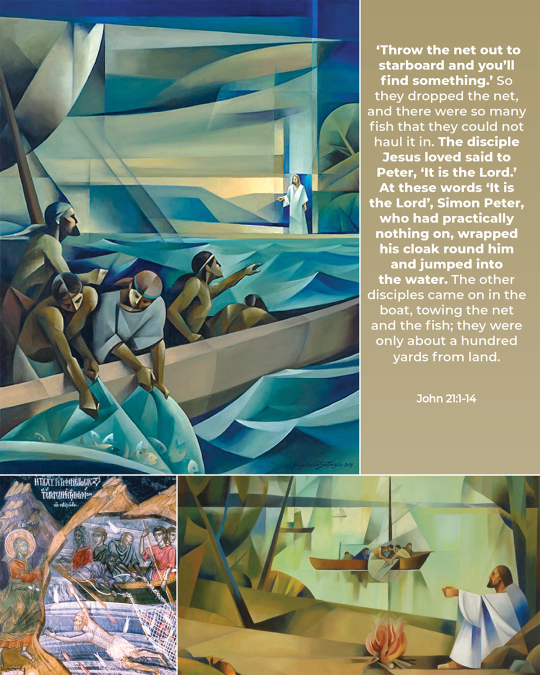
Jesus showed himself again to the disciples. It was by the Sea of Tiberias, and it happened like this: Simon Peter, Thomas called the Twin, Nathanael from Cana in Galilee, the sons of Zebedee and two more of his disciples were together. Simon Peter said, ‘I’m going fishing.’ They replied, ‘We’ll come with you.’ They went out and got into the boat but caught nothing that night.
It was light by now and there stood Jesus on the shore, though the disciples did not realise that it was Jesus. Jesus called out, ‘Have you caught anything, friends?’ And when they answered, ‘No’, he said, ‘Throw the net out to starboard and you’ll find something.’ So they dropped the net, and there were so many fish that they could not haul it in. The disciple Jesus loved said to Peter, ‘It is the Lord.’ At these words ‘It is the Lord’, Simon Peter, who had practically nothing on, wrapped his cloak round him and jumped into the water. The other disciples came on in the boat, towing the net and the fish; they were only about a hundred yards from land.
As soon as they came ashore they saw that there was some bread there, and a charcoal fire with fish cooking on it. Jesus said, ‘Bring some of the fish you have just caught.’ Simon Peter went aboard and dragged the net to the shore, full of big fish, one hundred and fifty-three of them; and in spite of there being so many the net was not broken. Jesus said to them, ‘Come and have breakfast.’ None of the disciples was bold enough to ask, ‘Who are you?’; they knew quite well it was the Lord. Jesus then stepped forward, took the bread and gave it to them, and the same with the fish. This was the third time that Jesus showed himself to the disciples after rising from the dead.
[John 21:1-14]
#lectiodivina#scripture#catholic#christianity#carmelite#carmelites#prayer#faith#spirituality#kingdomofgod#goodnews#godslove#forgiveness#peace#hope#love#courage#newtestament#easter#gospel#jesus#christ#truth#holyspirit#lightofchrist#salvation#miracle
6 notes
·
View notes
Text
One Minute Reflection – 14 January – Why did our Lord change water into wine as His first Sign? – St Ephrem
One Minute Reflection – 14 January – “The Month of the Most Holy Name of Jesus and of the Holy Family”– Second Sunday after the Epiphany and the Feast day of St Hilary (315-368) Confessor, Bishop, Father and Doctor of the Church – Romans 12:6-16; John 2:1-11 – Scripture search here: https://www.drbo.org/
“This, the first of His Signs, Jesus worked at Cana in Galilee and manifested His Glory and…

View On WordPress
8 notes
·
View notes
Text
Catechism of the Catholic Church - Paragraph # 528
Today we celebrate 3 theophanies or epiphanies (the interchangeable names for today's feast), not just the coming of the Magi. From the Catechism:
528 The Epiphany is the manifestation of Jesus as Messiah of Israel, Son of God and Savior of the world. The great feast of Epiphany celebrates the adoration of Jesus by the wise men (magi) from the East, together with his baptism in the Jordan and the wedding feast at Cana in Galilee. In the magi, representatives of the neighboring pagan religions, the Gospel sees the first-fruits of the nations, who welcome the good news of salvation through the Incarnation. The magi's coming to Jerusalem in order to pay homage to the king of the Jews shows that they seek in Israel, in the messianic light of the star of David, the one who will be king of the nations. Their coming means that pagans can discover Jesus and worship him as Son of God and Savior of the world only by turning towards the Jews and receiving from them the messianic promise as contained in the Old Testament. The Epiphany shows that "the full number of the nations" now takes its "place in the family of the patriarchs", and acquires Israelitica dignitas (is made "worthy of the heritage of Israel").
11 notes
·
View notes
Text
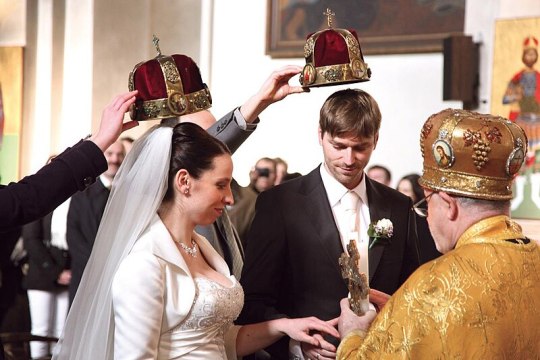

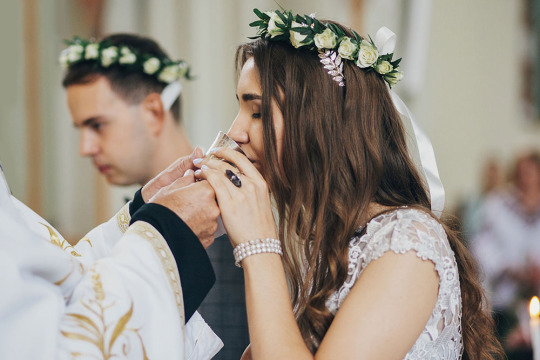

The Trinitarian mystery of unity in diversity applies not only to the doctrine of the Church but to the doctrine of marriage. Man is made in the image of the Trinity, and except in special cases he is not intended by God to live alone, but in a family. And just as God blessed the first family, commanding Adam and Eve to be fruitful and multiply, so the Church today gives its blessing to the union of man and woman. Marriage is not only a state of nature but a state of grace. Married life, no less than the life of a monk, is a special vocation, requiring a particular gift or charisma from the Holy Spirit; and this gift is conferred in the sacrament of Holy Matrimony.
The Marriage Service is divided into two parts, formally held separately but now celebrated in immediate succession: the preliminary Office of Betrothal, and the Office of Crowning, which constitutes the sacrament proper. At the Betrothal service the chief ceremony is the blessing and exchanging of rings; this is an outward token that the two partners join in marriage of their own free will and consent, for without free consent on both sides there can be no sacrament of Christian marriage. The second part of the service culminates in the ceremony of coronation: on the heads of the bridegroom and bride the priest places crowns, made among the Greeks of leaves and flowers, but among the Russians of silver or gold. This, the outward and visible sign of the sacrament, signifies the special grace which the couple receive from the Holy Spirit, before they set out to found a new family or domestic Church. The crowns are crowns of joy, but they are also crowns of martyrdom, since every true marriage involves an immeasurable self sacrifice on both sides. At the end of the service the newly married couple drink from the same up of wine, which recalls the miracle at the marriage feast of Cana in Galilee: this common cup is a symbol of the fact that henceforward they will share a common life with one another.
-- Kallistos Ware, The Orthodox Church
8 notes
·
View notes
Text
The first two signs in the Gospel of John took place at Cana of Galilee. The first was at the best party ever – a wedding party. The second was connected with the worst tragedy ever – the illness and soon death of a child. Jesus is real in both aspects.
David Guzik
18 notes
·
View notes
Text
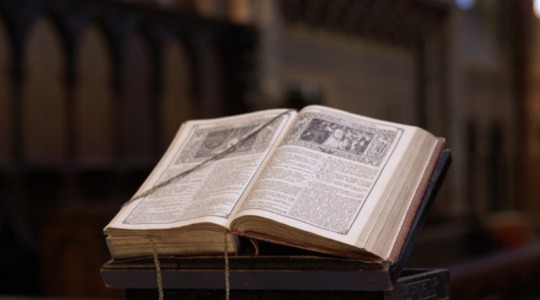
5th April >> Mass Readings (Except USA)
Easter Friday
(Liturgical Colour: White. Year: B(II))
First Reading
Acts of the Apostles 4:1-12
The name of Jesus Christ is the only one by which we can be saved.
While Peter and John were talking to the people the priests came up to them, accompanied by the captain of the Temple and the Sadducees. They were extremely annoyed at their teaching the people the doctrine of the resurrection from the dead by proclaiming the resurrection of Jesus. They arrested them, but as it was already late, they held them till the next day. But many of those who had listened to their message became believers, the total number of whom had now risen to something like five thousand.
The next day the rulers, elders and scribes had a meeting in Jerusalem with Annas the high priest, Caiaphas, Jonathan, Alexander and all the members of the high-priestly families. They made the prisoners stand in the middle and began to interrogate them, ‘By what power, and by whose name have you men done this?’ Then Peter, filled with the Holy Spirit, addressed them, ‘Rulers of the people, and elders! If you are questioning us today about an act of kindness to a cripple, and asking us how he was healed, then I am glad to tell you all, and would indeed be glad to tell the whole people of Israel, that it was by the name of Jesus Christ the Nazarene, the one you crucified, whom God raised from the dead, by this name and by no other that this man is able to stand up perfectly healthy, here in your presence, today. This is the stone rejected by you the builders, but which has proved to be the keystone. For of all the names in the world given to men, this is the only one by which we can be saved.’
The Word of the Lord
R/ Thanks be to God.
Responsorial Psalm
Psalm 117(118):1-2,4,22-27
R/ The stone which the builders rejected has become the corner stone.
or
R/ Alleluia, alleluia, alleluia!
Give thanks to the Lord for he is good,
for his love has no end.
Let the sons of Israel say:
‘His love has no end.’
Let those who fear the Lord say:
‘His love has no end.’
R/ The stone which the builders rejected has become the corner stone.
or
R/ Alleluia, alleluia, alleluia!
The stone which the builders rejected
has become the corner stone.
This is the work of the Lord,
a marvel in our eyes.
This day was made by the Lord;
we rejoice and are glad.
R/ The stone which the builders rejected has become the corner stone.
or
R/ Alleluia, alleluia, alleluia!
O Lord, grant us salvation;
O Lord, grant success.
Blessed in the name of the Lord
is he who comes.
We bless you from the house of the Lord;
the Lord God is our light.
R/ The stone which the builders rejected has become the corner stone.
or
R/ Alleluia, alleluia, alleluia!
Sequence
Victimae Paschali Laudes
Christians, to the Paschal Victim
offer sacrifice and praise.
The sheep are ransomed by the Lamb;
and Christ, the undefiled,
hath sinners to his Father reconciled.
Death with life contended:
combat strangely ended!
Life’s own Champion, slain,
yet lives to reign.
Tell us, Mary:
say what thou didst see
upon the way.
The tomb the Living did enclose;
I saw Christ’s glory as he rose!
The angels there attesting;
shroud with grave-clothes resting.
Christ, my hope, has risen:
he goes before you into Galilee.
That Christ is truly risen
from the dead we know.
Victorious king, thy mercy show!
Gospel Acclamation
Psalm 117:24
Alleluia, alleluia!
This day was made by the Lord:
we rejoice and are glad.
Alleluia!
Gospel
John 21:1-14
Jesus stepped forward, took the bread and gave it to them, and the same with the fish.
Jesus showed himself again to the disciples. It was by the Sea of Tiberias, and it happened like this: Simon Peter, Thomas called the Twin, Nathanael from Cana in Galilee, the sons of Zebedee and two more of his disciples were together. Simon Peter said, ‘I’m going fishing.’ They replied, ‘We’ll come with you.’ They went out and got into the boat but caught nothing that night.
It was light by now and there stood Jesus on the shore, though the disciples did not realise that it was Jesus. Jesus called out, ‘Have you caught anything, friends?’ And when they answered, ‘No’, he said, ‘Throw the net out to starboard and you’ll find something.’ So they dropped the net, and there were so many fish that they could not haul it in. The disciple Jesus loved said to Peter, ‘It is the Lord.’ At these words ‘It is the Lord’, Simon Peter, who had practically nothing on, wrapped his cloak round him and jumped into the water. The other disciples came on in the boat, towing the net and the fish; they were only about a hundred yards from land.
As soon as they came ashore they saw that there was some bread there, and a charcoal fire with fish cooking on it. Jesus said, ‘Bring some of the fish you have just caught.’ Simon Peter went aboard and dragged the net to the shore, full of big fish, one hundred and fifty-three of them; and in spite of there being so many the net was not broken. Jesus said to them, ‘Come and have breakfast.’ None of the disciples was bold enough to ask, ‘Who are you?’; they knew quite well it was the Lord. Jesus then stepped forward, took the bread and gave it to them, and the same with the fish. This was the third time that Jesus showed himself to the disciples after rising from the dead.
The Gospel of the Lord
R/ Praise to you, Lord Jesus Christ.
3 notes
·
View notes
Text
Live Stream Sunday School - September 11, 2022
Live Stream Sunday School – September 11, 2022
https://www.facebook.com/gaines.melvin/videos/655230325697307
Sunday school session for Akron Alliance Fellowship Church, Akron OH.
John 2:1-11
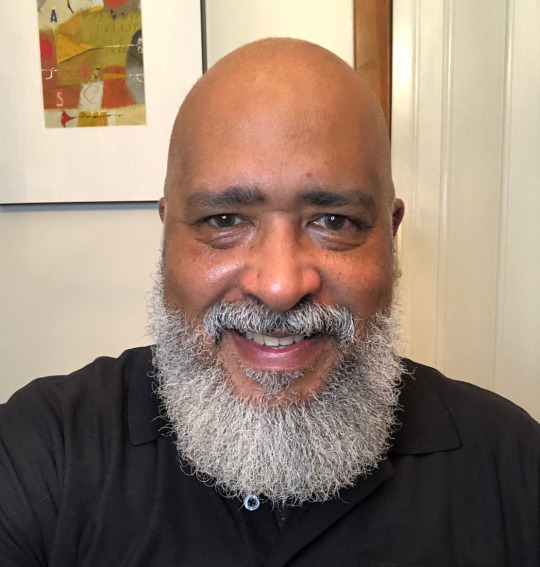
View On WordPress
#believe#Cana#celebration#custom#disciple#festival#Galilee#God#host#jar#Jesus#Mary#miracle#mission#servant#water#wedding#wine
0 notes